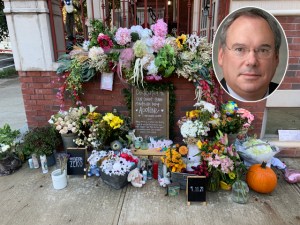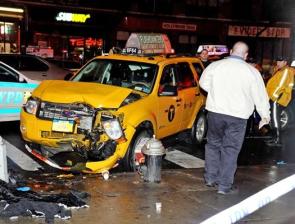New York State Finally Has a New DMV Commissioner. Here’s What He Needs to Do
If confirmed by the legislature, Buffalo Comptroller Mark Schroeder will fill a seat left vacant since Gov. Cuomo's first term.

This is the first in a new Streetsblog series called “Best Practices,” which will provide New York State and City policymakers with examples of how their counterparts elsewhere solved problems and made their communities safer and more livable. Issue 1: Regulating cars and drivers.
At long last, the state Department of Motor Vehicles is getting a commissioner: Buffalo Comptroller Mark Schroeder. And safe streets advocates — whose entreaties to the DMV fell on deaf ears during the four-plus years the agency lacked a leader — have a laundry list of desired policy changes.
As the chief regulator of the state’s drivers and motor vehicles, the DMV is uniquely positioned to be a force for safer, more human roads. But the agency consistently avoids doing that. For one thing, the DMV commissioner position has been little more than a patronage job. The most recent DMV commissioner, former Broome Country Executive Barbara Fiala, was caught driving 17 miles over the speed limit while in office. For seconds, the agency promotes rather than regulates car use.
Schroeder must be confirmed by the state senate before he takes office and declined to take questions from Streetsblog, a hardly auspicious start. In the meantime, here are some top priorities he should address on Days 1 through 6 — simple best practices from around the country and globe.
You’re welcome, Mr. Commissioner.
Make it harder to drive
https://www.youtube.com/watch?time_continue=7&v=HUlG387VRg4
How easy is it to get a driver’s license in New York State? If you’re over 18, all you have to do is pay $50, sit through a five-hour course, and take a brief road test.
Compare that to Germany, where driver’s ed include an 8-hour first-aid training, 14 to 20 hours of technical training, 12 or more 90-minute driving sessions, and multiple written tests. The 2014 CNET video above explains that process. As a result, Germany has a road fatality rate of 4.3 per 100,000 inhabitants. In the U.S., that rate is 10.9. In New York State, it is 5.0. New York City’s fatality rate is three times that of Berlin’s.
Going even further, in some countries, acquiring a car is a gargantuan effort, as this 2016 Streetfilms mini-doc from Japan showed.
Make license revocation easier
Drivers are involved in fatal collisions are typically brought before a DMV trial judge, who determines whether the driver will be penalized and to what extent.
Under Governor Cuomo, the hearing process has repeatedly failed victims and their families. Hearings are often held months, even years, after collisions occur, allowing drivers who commit traffic crimes to remain behind the wheel indefinitely.
When they do finally happen, the hearings are inconsistent and ineffective, as Streetsblog has documented. Hearing officers sometimes rely on incomplete or outdated police reports, and have been known to take defendants at their word without sufficient evidence. Drivers rarely receive more than a slap on the wrist — and are often exonerated for their actions. Penalties, when there are any, are applied arbitrarily.
Families for Safe Streets has proposed a set of reforms to address the broken hearing process: mandatory and immediate three-month suspensions for drivers who commit serious offenses, mandatory license suspension for commercial drivers with six or more penalty points on their licenses, and a stricter point system more generally that applies higher point values for more serious collisions.
Currently, it takes 11 penalty points to warrant a license suspension. Violations like “reckless driving” and failure to yield only result in five and three points, respectively. In Germany, which introduced its points system around the same time as New York, it only takes eight points before a driver’s license is suspended.
Changing that would require action the state legislature, which would require leadership from the Cuomo administration.
“Existing legislation is going to completely constrain what the DMV can do,” said attorney Steve Vaccaro, who has represented many victims of traffic violence and their families at DMV proceedings.
Trial hearings must respect victims and their families
Right now, victims of traffic crashes and their families have only a limited role at DMV trial hearings. They can seek an adjournment of the hearing and their legal representation can suggest questions for the judge to ask. That’s it.
“When a driver kills somebody, we don’t have any standing in the hearing,” said Families for Safe Streets co-founder Amy Cohen, whose son was killed on Prospect Park West in 2013. “I’ve been at hearings with family members and they kick the family out of the room. The standards have to be higher.” (The driver who killed Cohen’s son Sammy ended up getting only a six-month license suspension, despite clear evidence of recklessness.)
In particular, advocates would like to see the DMV institute its own version of the Federal Crime Victim’s Bill of Rights [PDF], which would give victims of road violence the same rights bestowed to victims of other crimes, including access to police reports and notification of DMV trial hearings.
“For us, at the hearing, you want to make sure the driver understands the impact,” said Hsi-Pei Liao, another member Families for Safe Streets, whose daughter Allison was killed crossing the street in Flushing in 2014. “It’s important for us as families who were impacted.”
Aggressive retesting of drivers
As drivers age, the likelihood that they will be involved in a car crash increases, according to the Centers for Disease Control.
But the DMV currently does little about that, taking no special precautions to ensure older drivers are capable of driving safely beyond a simple vision test that doesn’t even require an in-person appointment.
DMV has argued that it “cannot treat license holders differently based solely upon their age,” but in 33 states and the District of Columbia, seniors are treated differently than other drivers in one way or another. In Illinois and New Hampshire, drivers over 75-years-old have to retake their road tests.
Rita Barravecchio, whose niece Madeline Sershen was killed by an 88-year-old driver last year, would like to see similar steps taken in New York.
“As an individual gets older, there are changes that occur physically in their body,” Barravecchio said. “More frequent renewals would help them reassess themselves.”
Give doctors immunity to report potentially dangerous drivers
The DMV does re-evaluate some drivers — but only if someone files a DS-7 form to anonymously report them.
Advocates suspect that the DS-7 form process is a black hole.
“The question we have for DMV, which we have not yet gotten answers to, is what then happens to this form,” said Barravecchio, who has joined up with other Families for Safe Streets members to push for DMV reform.
When Dorothy Bruns struck and killed multiple pedestrians in Park Slope, observers wondered how she was allowed behind the wheel in the first place, given her medical history.
To keep drivers like Bruns off the road, Barravecchio said, the state legislature could pass a “doctor immunity” law, which would allow medical providers to breach doctor-patient confidentiality rules in order to report patients who they believe should not drive.
Several states already do that, according to the National Highway Traffic Safety Commission.


